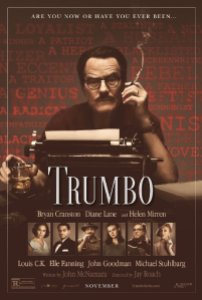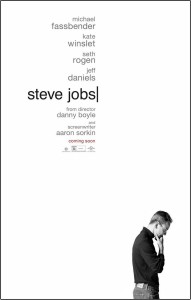 Did the injustice of the Hollywood Blacklist have to do with Americans’ Cold War fears, how we suppressed the First Amendment rights of thousands, or how we wrongly persecuted and led a witch hunt against innocents and those just expressing political beliefs? Or was it all because Dalton Trumbo was just too good?
Did the injustice of the Hollywood Blacklist have to do with Americans’ Cold War fears, how we suppressed the First Amendment rights of thousands, or how we wrongly persecuted and led a witch hunt against innocents and those just expressing political beliefs? Or was it all because Dalton Trumbo was just too good?
“Trumbo”, the biopic on the life of the Oscar winning, yet blacklisted screenwriter, is filled with some stirring sentiments and American values. As Trumbo, Bryan Cranston delivers winning speeches with impeccable diction, all while maintaining his position as a contentious, even disagreeable figure. Jay Roach’s film though may just be a little too fun for its lofty ambitions. The screenplay touts values of Free Speech, but the story itself suggests the motto, “Be so good they can’t ignore you.”
Trumbo was brought up in the Golden Age of Hollywood, so the film is fascinated with that Old Hollywood charm, playing off campy fun biopic beats as it checks off the list of stars who made their way through Trumbo’s life: Edward G. Robinson, John Wayne, Kirk Douglas, Otto Preminger. The cast all gets their moments to do their mini-impressions of some of Hollywood’s most iconic and eccentric figures. “Trumbo” even opens with a montage of some of Trumbo’s many credits and takes us through his work on “Roman Holiday,” “Spartacus”, “The Brave One”, and “Exodus”, and Roach peppers the score with slinky jazz and a light, breezy tone. Much early on is even told through news reels rather than personal moments.
And yet “Trumbo” can be questionably chipper when dealing with the severity of The Blacklist and The Hollywood 10. Trumbo was one of the first waves of Communists brought in front of HUAC, or the House Un-American Activities Committee, to testify and name names about his involvement with the Communist Party. Many Hollywood insiders, including his liberal friend Edward G. Robinson (Michael Stuhlbarg), sold him and his colleagues out. In turn, Trumbo and the other nine spent up to a year in prison despite not committing a crime, and they were barred from ever working in Hollywood again.
Trumbo instead took up aliases and fixed up bad B-movie scripts for producer Frank King (John Goodman), and Roach has a lot of fun with this concept. The behind-the-scenes dealings and a money-grubbing John Goodman brandishing a baseball bat at those threatening to boycott him are hugely entertaining, and often more of interest to Roach than the pain and suffering brought on by the Blacklist.
Roach illustrates the hatred of Communists through plainspoken bigots throwing drinks at Trumbo at a movie theater or the big talk threats of Hollywood gossip columnist Hedda Hopper (Helen Mirren). But it overlooks the Trumbo family retreat to Mexico, or the deaths that even took place during the period. Instead he zones in on the family drama and how Trumbo’s shadow screenplay work took a toll on his wife Cleo (Diane Lane) and his equally political and outspoken daughter Nikola (Elle Fanning in Nikola’s teenage years).
Cranston though is largely the catalyst behind “Trumbo’s” added weight, political significance and modern relevance. His Hollywood 10 colleague Arlen Hird (Louis C.K.) asks, “Do you have to say everything like it’s going to be chiseled onto a rock?” Cranston’s hitched up pants, his hunched posture as he marches about the room, and the way he chomps on a cigarette or cigar certainly smack of a “performance”, but he’s modest enough in his speech to make it convincing. Where everyone else is clear-cut about their politics, Cranston plays Trumbo as largely articulate and argumentative of principles over strict ideas. In one scene he stands up to John Wayne and challenges Duke’s non-existent war record, despite how he invokes the war to condemn people like Trumbo. The wit and words behind Cranston’s performance help elevate Trumbo as an artist and thinker but also show how he might be difficult at parties.
Roach’s film may be too entrenched in Hollywood history and royalty to not somewhat diminish the Cold War era hardships of the Blacklist, but Trumbo’s name was suppressed for years, and now this film proudly adorns it as a fitting title and story.
3 stars
 Steve Jobs and Apple didn’t invent the personal computer. They didn’t invent the portable music player, or the smart phone, or the tablet, or most recently wearable tech. What Steve Jobs did was make technology inviting, accessible and fashionable. That was his innovation and his genius. And it’s something of a paradox that the most successful tech giant is not the one with the newest or the best technology, but the one that reaches its users personally.
Steve Jobs and Apple didn’t invent the personal computer. They didn’t invent the portable music player, or the smart phone, or the tablet, or most recently wearable tech. What Steve Jobs did was make technology inviting, accessible and fashionable. That was his innovation and his genius. And it’s something of a paradox that the most successful tech giant is not the one with the newest or the best technology, but the one that reaches its users personally.